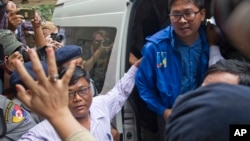Myanmar has accused Reuters reporters Wa Lone, 31, and Kyaw Soe Oo, 27, of breaching the country's Official Secrets Act, a little-used law from colonial rule. It will be their second appearance in court and the prosecutor could announce the charges sought against them.
The following is some information about the case:
The two journalists
Wa Lone's first job in journalism was with the People's Age journal. In 2014, he joined the English-language Myanmar Times, covering the 2015 election that swept Nobel peace prize laureate Aung San Suu Kyi to power. Wa Lone wrote a children's book and co-founded a charity that promotes tolerance between different ethnic groups and helps orphans.
Wa Lone joined Reuters in 2016 and made his mark with reports on sensitive subjects. His work on the crisis that erupted in Rakhine State in October 2016 won him a joint honorable mention from the Society of Publishers in Asia in its annual awards. He returned to the region last year, after attacks by Rohingya Muslim militants triggered a crackdown by the army and an exodus to Bangladesh of some 650,000 Rohingya.
Wa Lone has also covered stories ranging from economic development and infrastructure projects to local elections and health issues.
Kyaw Soe Oo is an ethnic Rakhine Buddhist who grew up in the state capital, Sittwe. He started his reporting career with the online Rakhine Development News and later worked at the Root Investigative Agency.
Friends say Kyaw Soe Oo avoided becoming caught up in the tension between Rakhine Buddhists and Rohingya Muslims but the conflict drew him into journalism. He has been with Reuters since September last year.
The arrests and accusations
Wa Lone and Kyaw Soe Oo were arrested on Dec. 12, after they were invited to meet police for dinner in Yangon, on suspicion of violating the Official Secrets Act.
The Ministry of Information has cited the police as saying they were "arrested for possessing important and secret government documents related to Rakhine State and security forces."
The ministry said they had "illegally acquired information with the intention to share it with foreign media."
The government only announced the arrest of the reporters some 24 hours after they were detained and the two were held at an undisclosed location without contact with families or lawyers for two weeks.
They have told relatives they were arrested almost immediately after being handed some documents by two policemen who they met at the restaurant for the first time. They did not read the documents before they were arrested, the relatives said.
Police have not commented on that account. Reuters has been unable to ask Wa Lone and Kyaw Soe Oo about the circumstances of their arrest.
The government has said two police officers were also arrested and charged under the Official Secrets Act. According to the reporters, the police arrested were not those who provided the documents.
The government has given no further information on the police arrested.
The law
The Official Secrets Act dates back to 1923, when Myanmar, then known as Burma, was a province of British India. It carries a maximum prison sentence of 14 years.
Legal experts say prosecutions under it have been rare.
The most well-documented recent case was in 2014, when the Unity Journal weekly published an article it said exposed a secret military chemical weapons factory.
Police arrested the newspaper's chief executive and four journalists. A civilian court sentenced them to 10 years in prison with hard labor - later reduced to seven years. The case was widely seen as a warning that military affairs remained off-limits even though direct military rule had ended and censorship had been lifted.
The five were released under an amnesty in April 2016, soon after Suu Kyi's party came to power.
The court proceedings
Wa Lone and Kyaw Soe Oo were held incommunicado by the police for two weeks before appearing in court on Dec. 27, when they were remanded for another two weeks. During the hearing, they were allowed to meet relatives and a lawyer for the first time since being arrested.
Only their lawyer and relatives, along with police and government lawyers, were allowed into the court. The reporters said they had not been mistreated in custody.
Reaction
Government officials from some of the world's major nations, including the United States, Britain and Canada, as well as top U.N. officials, have called for the release of the journalists.
Surakiart Sathirathai, a former Thai foreign minister and the head of a new international advisory panel on the Rohingya crisis, also expressed concern at the arrest of the reporters and said he hoped the case did not lead to broader restrictions on the international media.
Several non-governmental and journalist organizations have called the arrests an attack on the freedom of the press.





